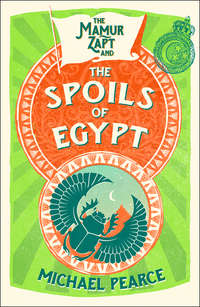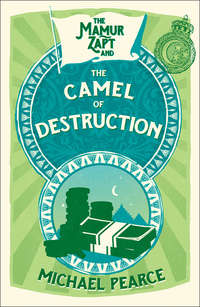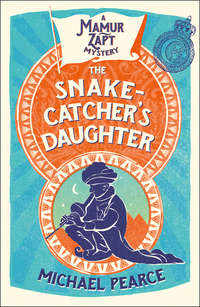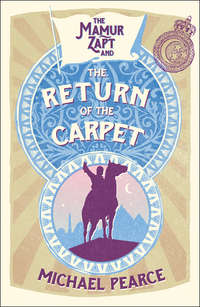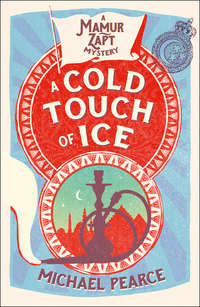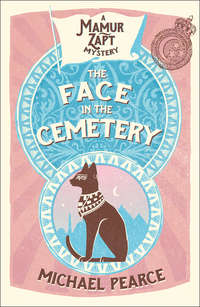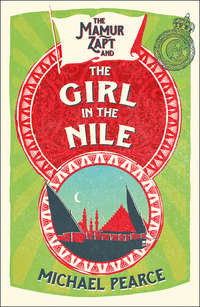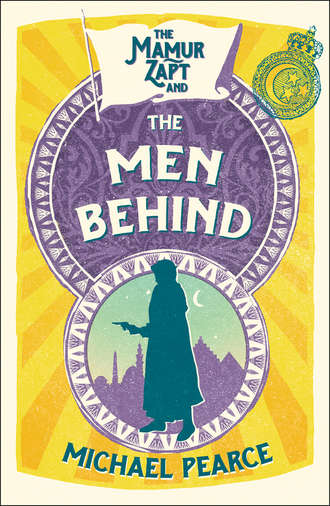
Полная версия
The Mamur Zapt and the Men Behind
And incurring any possible odium.
Mohammed Bishari was watching him.
‘Of course, if you object to my conduct of the case it is always open to the Administration to terminate my connection with it.’
And that, from the point of view of the Parquet, would be even better. If the British could be persuaded, or provoked, into rejecting them publicly then they would not only escape odium, they might even gain credit in the eyes of the Nationalists.
Owen smiled sweetly.
‘Far from objecting to your conduct of the case, I am looking forward to an extended opportunity to study the obvious talent of the Parquet in action. Just for the moment, however, I am sure you will agree that Mr Fairclough has been under very considerable strain recently and would benefit from a recess: quite a long one, I think, will be necessary.’
Paul rang.
‘There’s a perfectly loathsome fellow I would like you to meet.’
‘No, thanks,’ said Owen. ‘I’ve got a lot on my mind.’
‘I know you are saving Cairo. And ordinarily I would not dream of interrupting you. But this abominable creature has been left on my hands and he will insist on seeing the night life of Cairo.’
‘Look—’
‘I am all for letting him go on his own in the hope that he won’t come back. However, the Consul-General and the Khedive take a different view. He’s a member of that delegation that’s visiting us and they think he ought to have an escort. Given the present situation. And the fact that they think they can get some money out of him.’
‘Can’t you escort him?’
‘No. I’m already escorting somebody else. The one I’m escorting is a Temperance Performer and I don’t think she and Roper would mix.’
‘What about young Bowden?’
‘Young Bowden’s too young. I like to think he doesn’t know the sort of places Roper is bent on going to. And he wouldn’t be up to it anyway. Roper’s a hard case—he’s spent some years in the diamond fields down south. Things could get out of hand. We need someone more mature and used to rough-houses.’
‘McPhee?’
McPhee was the Assistant Commandant of the Cairo Police.
‘Used to knocking people around, certainly. But is he mature? He always strikes me as rather prim. Puritanical, too. I don’t think he and Roper would get on.’
‘I don’t think I’d get on with him either from what you say.’
‘Ah, but you have the brains to subdue personal feeling in the call of duty.’
‘I don’t think—’
‘The Old Man does. Owen’s just the chap he said.’
‘I’ll bet.’
‘True. He thinks it requires a political touch, you see. And he has a high regard for your political touch.’
‘Why the hell does it require a political touch?’
‘Because Roper has powerful friends. He’s been sent out here by some Syndicate or other who are interested in the Streeter Concession.’
‘Emeralds? I wouldn’t have thought there was enough of them to interest anyone big.’
‘I wouldn’t have thought so either. However, the Khedive does. The prospect of money, any money, is enough to send him into a tizzy. And the Old Man is just playing along. If the Syndicate finds there are more emeralds than Streeter thinks, then that’s good. Good for the Syndicate, certainly, good for Egypt, possibly. If it doesn’t, then at least the subject will have occupied the Khedive’s mind for a time and kept him out of the Old Man’s hair. So that would be good too. I don’t know about the emeralds, but Roper’s certainly valuable property. And has to be guarded.’
‘Oh Christ,’ said Owen resignedly.
‘Please please please please. And if that’s not enough, the Old Man says it’s an order.’
Owen made one last attempt.
‘How about the Army? Surely some young officer—?’
‘Confined to barracks,’ said Paul. ‘You suggested it. Remember?’
So that evening Owen found himself escorting the impossible Roper round Cairo’s night spots. They started with the dancing-girls since that was where Roper wanted to start: ‘The best, mind, the best.’ Owen took him at his word and led him to a place below the Citadel, since that was the quarter where the Ghawazi gipsies lived, who provided the best dancing-girls in the country.
Roper was not, however, interested in the finer points so they moved on to the Sharia Wagh el Birket. The Sharia was picturesque in its way. One side of it was taken up by arcades with dubious cafés beneath them. The other side was given over to the Ladies of the Night. All the upper rooms had balconies; and every balcony had a Lady.
They drooped alluringly over the woodwork and because the street was so ill-lit, indistinct suggestion prevailed over close analysis. The men sitting at the tables of the cafés opposite gathered only a heady impression of light draperies trailing exotically from lofty balconies under the deep night blue of Egypt, while from the rooms behind lamps with rose-coloured shades extended diffuse invitation.
‘I like a bit of class,’ said Roper, impressed.
They went into a club beneath the balconies and watched a plump girl doing a belly-dance.
‘God, man, look at that!’ breathed Roper.
Aware of his interest, the plump girl wobbled closer. Although inexpert, she had mastered sufficient of the traditional art to give the impression of being able to move the four quarters of her abdomen independently. Roper, considerably the worse for wear by this time, made a grab at her.
The girl, used to such advances, evaded him with ease. Her tummy settled down to a steady, rhythmic rotation.
Roper made another lunge. This time he caught her by the wrist.
‘Not here, sweetie!’ said the girl. ‘Upstairs.’
She led Roper away.
Owen beckoned the barman over.
‘It would be a mistake if too much happened to him. OK?’
The barman nodded and disappeared into an inner room.
A moment or two later he re-emerged and took up his position impassively. However, a glass suddenly materialized beneath Owen’s arm.
‘For the Mamur Zapt,’ the waiter whispered confidingly.
Owen was not altogether pleased at being so famous. But Cairo, at that time a small city, was like a village.
A dancer came over and sat in the chair opposite him.
‘Hello, dear,’ she said.
‘No thanks.’
‘Oh, don’t be like that.’
‘I’m the one who’s got to stay sober.’
‘Yes,’ said the girl, ‘you’ll need to. Your friend won’t.’
Roper had been drinking three or possibly four to Owen’s one. Owen was counting on him lapsing into insensibility before long. That was the only prospect he could see of the evening ending.
‘Where are you from, love?’ inquired the girl.
‘Caerphilly.’
‘Oh.’ The girl was plainly disappointed. ‘I thought for a moment you came from near me.’
‘Tyneside?’
‘Durham.’
‘The accents can be a bit similar.’
The plump girl brought Roper back.
‘That was all right,’ he said to Owen.
‘A last drink.’
‘Hell, no, man. Haven’t started.’
The dancing began again. This time the second girl was on stage. She was less expert than the plump girl but by this time, no doubt, distinctions were escaping Roper. The café as a whole, mostly Arab, favoured plumpness and the applause was muted. Disappointed, the girl came towards Roper. The two went off together.
Owen was fed up. He was one of those people who wake very early in the morning and had been up since five. Conversely, he always fell asleep early in the evening. Or would if he could.
He felt a light touch on his arm. It was a gipsy girl.
‘I saw you at the Citadel,’ she said.
‘What are you doing over here?’
‘Business is better.’
Owen felt his pockets. The girl laughed.
‘You’re safe,’ she said. However, as she kept her hand on his arm he took the precaution of transferring his wallet to the button-down pocket of his shirt.
The girl laughed again.
‘That wouldn’t stop me,’ she said. ‘Why don’t you just give me some?’
‘Would you content yourself with that?’
‘Yes.’
Owen gave her some money.
‘Thank you.’ She looked around. ‘They’re all busy,’ she said. ‘I’ll stay here and talk to you for a moment.’
The gipsies worked in gangs. Unusually in this Muslim country they used both men and women. The women distracted attention while the men slipped round. Of course, the women were quite capable of picking a pocket themselves.
‘What’s your name?’
‘Soraya. Would you like to come with me?’
Owen shook his head regretfully.
‘It would be nice,’ he said. The Ghawazi girls were noted for their accomplishments. They were without exception strikingly pretty, with thin aquiline faces, long black hair and dark lustrous eyes. They did not wear veils. And what aroused Arab men almost beyond endurance was a general sauciness, a boldness which was almost totally at odds with the self-subjection normally required of Muslim women.
‘I’m with someone,’ he explained.
‘Yes,’ said the girl. ‘I saw him. He did not like the dancing at the Citadel.’
‘He is a stranger here. He does not know.’
‘You are not like him.’
‘I hope not.’
He tried out a few words of Egyptian Romany on her. She looked at him in surprise.
‘You speak our tongue?’
‘A little.’
The language spoken by the Egyptian gipsy was not pure Romany. Much of it consisted of Arabic so distorted as to be unintelligible to the native Egyptian. Some of the words, however, were of Persian or Hindustani origin, and this interested Owen, who had served in India before coming to Egypt.
He told her this.
‘I am a Halabi,’ she said, meaning that she was one of the gipsies who claimed Aleppo in Syria as their place of origin.
‘Have you been there?’
‘No.’
Roper returned, weaving his way unsteadily through the tables.
‘Hello!’ he said. ‘Who have you got there?’
‘Her name is Soraya.’
‘How about coming upstairs with me?’ he said.
Soraya considered.
‘I would prefer to go with you,’ she said to Owen.
‘You can bloody come with me,’ said Roper.
He fumbled in his pocket and pulled out a wad of banknotes.
‘Here!’ he said. ‘Do you want some of these?’
Soraya’s eyes glistened.
‘No knives!’ warned Owen.
‘Just keep out of it,’ said Roper. He grabbed the girl by the arm.
She pulled a knife out of her sleeve and slashed him across the hand. Roper swore and let go of her arm. She snatched the bank-notes, ducked under his arm and was gone.
‘What the hell!’ said Roper, dazed.
He sat down heavily in his chair and looked at his hand. A film of blood spread slowly back to his wrist.
‘Well, damn me!’ he said.
‘Want a handkerchief?’ said Owen.
‘What do you think I am?’ said Roper. ‘Some kind of pansy?’
‘To tie it up,’ said Owen, ‘so that the blood doesn’t get on your suit.’
Roper swore again.
‘She a friend of yours?’ he said to Owen.
‘Not until now.’
Roper went on looking in dazed fashion at his hand. Suddenly he thumped on the table.
‘Drink!’ he said. ‘Drink!’
The waiter brought him a whisky, which he downed in one.
‘That’s better!’ he said. ‘Bring me another!’
The waiter caught Owen’s eye.
‘Bring him another,’ said Owen. ‘Make it a special one.’
Roper drank that too. Owen waited for him to fall. Instead, he clutched at the table and steadied himself. He seemed to be trying to think.
‘She bloody knifed me!’ he muttered. He looked at Owen. ‘Friend of yours, wasn’t she? Well, she’s no friend of mine!’
He lunged across the table at Owen. Owen caught his arm and held him there.
‘Shut up!’ he said. ‘You’re going home!’
‘Am I hell!’
Roper tried to throw himself at Owen, missed, and fell on the floor. Owen put a foot on his throat.
‘Get an arabeah,’ he said to the waiter.
He held Roper there until the arabeah came. Then he stooped down, hauled Roper upright and pushed him towards the door.
A waiter plucked at his arm.
‘The drinks, effendi.’
Owen put his hand in his pocket, thought better and put it in Roper’s pocket.
Roper suddenly tore himself away. He caught hold of a table and hurled it across the room, then swung out at an Egyptian who had been sitting at it. As the man fell, the waiters closed in.
The knot of struggling men edged towards the door. Just as they got there Roper went limp. He stood motionless for a moment, then bent forward and was violently sick.
The waiters sprang back, cursing.
Roper slowly collapsed until he was kneeling on the ground in the doorway both hands pressed to his middle.
‘Christ, I feel awful!’ he said.
The second girl, the Durham one, came forward and put a hand under his elbow.
‘Come on, love,’ she said.
Roper got to his feet and looked around dazedly.
‘Christ, I feel awful,’ he said again.
With the plump girl helping on the other side, the Durham girl manœuvred him out of the door. An arabeah was drawn up, waiting. As they tried to get him inside he collapsed again and fell under the wheels, groaning.
Owen bent down, caught him by the collar and tried to lift him up. The girls, used to such scenes, pulled Roper’s arms over their shoulders and took his weight. At the last moment, however, he lurched and they all fell into a heap. Owen was pulled down too and found his nose pressed deep into the plump girl’s warm, soft flesh.
‘Owen!’ It was McPhee’s surprised voice. ‘Owen! What on earth—’
‘Give us a hand, for Christ’s sake!’
They eventually succeeded in bundling Roper into the arabeah. Owen took the money out of Roper’s pocket, paid the waiters and gave some to the girls. They would probably have picked Roper’s pockets anyway.
He was about to get into the arabeah himself when he suddenly had a strong sense that somebody was behind him. He looked up quickly. There was no one there. For a moment, though, he had the impression that somebody was standing in the shadow. But then in Cairo there was always somebody standing in the shadow, waiting.
CHAPTER 4
Owen was sitting at his desk in the Bab el Khalk when he heard a cru-ump. He knew at once what it was.
He stayed sitting. Within minutes bare feet came scurrying along the corridor. A man burst into the room.
‘Effendi! Oh, effendi!’ he gasped. ‘Come quick! It is terrible.’
‘Take me,’ said Owen.
They hurried along the Sharia Mohammed Ali and then branched off left into a maze of small streets, heading in the direction of the Ecole Khediviale de Droit, the Law School. There was confused shouting and a whistle blowing perpetually. There was a great cloud of dust which made Owen gasp and choke, and men running about in the cloud.
The explosion had demolished the entire corner of a building. A wall swayed drunkenly. Even as Owen watched, it crumbled down to join the pile of rubble which lay in a slanting heap against what was left of the building.
A fresh cloud of dust rose up. When it cleared, Owen saw that men were already picking at the rubble. A sharp-eyed, intelligent workman was directing operations, getting the men to pile the rubble to one side.
‘Is anyone under there?’ asked Owen.
‘God knows,’ said the man. ‘But it was a café.’
A woman started ululating. Through the ululation and the shouting and the screaming the whistle was still blowing. Owen looked up. A police constable was standing in a corner of the square, his eyes bulging with shock. He had a whistle in his mouth which he kept blowing and blowing.
‘Enough of that!’ said Owen. ‘Go to the Bab el Khalk and see the Bimbashi and tell him to bring some men.’
The constable stayed where he was. Owen gave him a push. The man collected himself and ran off.
There were more galabeahed figures pulling at the rubble now. The subsidiary pile of debris was growing. A few broken parts of furniture had joined the stones.
Owen suddenly became aware that there were other people in the square besides the workers. A peanut-seller lay on his back in the dust with a little crowd around him. He was moaning slightly.
Not far from him an injured water-carrier had been dragged into the shade. His bags of water had left watery trails behind them as they had been dragged with him. Presumably the sellers had been passing when the explosion had occurred.
There were youngsters in European-style clothes, students from the Law School probably. Some were supporting fellow students, others pulling at the rubble.
A large man in a blue galabeah, his face white with dust, went past holding his head in his hands. Two men went up to him but he shook them off and continued wandering round the square in a daze.
A young man in a suit knelt beside a man bleeding from the leg. He was tearing strips from the man’s undershirt and binding them round the wound: fairly expertly.
‘Are you a doctor?’ Owen asked.
‘Student,’ the man said briefly over his shoulder.
‘What happened?’
‘An explosion. There, in the café.’
‘Did you see it?’
‘Heard it. We were on our way there.’
‘It’s a student café, is it?’
‘Yes.’
‘Christ!’ Owen had a sudden vision of a crowded café and bodies buried under the rubble.
‘It shouldn’t have been too bad. The café’s empty at this time of day. A lecture was just finishing.’
‘What’s your name?’ asked Owen.
‘Deesa.’
Owen took note of the name and then went over to help the rubble-workers. They were pulling at a huge beam. He got men to hold the beam while he organized others to pull away the stones which were trapping it. It came clear and they lifted it away.
A large fair-haired man came into the square with a small troop of constables.
‘Good heavens!’ the man said.
‘Hello,’ said Owen. ‘It was a café with students. There may be some under here.’
‘Right,’ said the man, and began organizing his constables. They formed a chain and began passing debris along it. The constables were simple peasants from the villages and used to this sort of work. One of them, incongruously, began to sing.
After a while Owen left the rubble work. McPhee, a Boy-Scoutish sort of man, was better at this kind of thing than he was. The work of clearing the debris was now proceeding systematically. The sharp-faced, intelligent workman who had got started in the first place was now burrowing deep into the rubble.
The square was filling up with people, eager to help but getting in the way. Owen pulled a constable out and sent him for more help. He tried to get the crowd to keep back. Then, seeing that was useless, he borrowed McPhee’s idea and formed them into chains, getting them to clear away the subsidiary pile, which was threatening to topple back on to the rubble.
So far he had seen very few injured people.
The student he had been talking to had finished his bandaging and came over to stand beside Owen.
‘Are you sure it was empty?’ Owen asked.
‘Not empty,’ said the student. ‘Emptyish.’
He interrupted the large man with the white, dusty face as he went past for the umpteenth time.
‘Ali,’ he said. ‘Come here.’
Ali stopped obediently. The student took hold of his head and stared into his eyes. Then he released him.
‘Concussed,’ he said.
‘You’re not a law student,’ said Owen.
‘No, medical. I was visiting friends.’
‘Why,’ said Ali, in a tone of surprise, ‘it’s Deesa.’
‘Yes,’ said the student, ‘it’s Deesa. What happened, Ali?’
‘I don’t know,’ said the man. ‘I came to the door to take some air and then suddenly it was as if a giant put his hand to my back and pushed me. I fell into the street and lay there and when I looked up the building had gone. Where did it go to, Deesa?’
‘It fell down, Ali,’ said Deesa. ‘That is all that is left.’ He pointed to the rubble.
The big man shook his head disbelievingly.
‘When I looked up, it had gone,’ he repeated. ‘Where did it go to, Deesa?’
Конец ознакомительного фрагмента.
Текст предоставлен ООО «ЛитРес».
Прочитайте эту книгу целиком, купив полную легальную версию на ЛитРес.
Безопасно оплатить книгу можно банковской картой Visa, MasterCard, Maestro, со счета мобильного телефона, с платежного терминала, в салоне МТС или Связной, через PayPal, WebMoney, Яндекс.Деньги, QIWI Кошелек, бонусными картами или другим удобным Вам способом.


